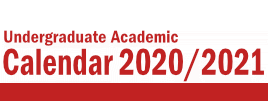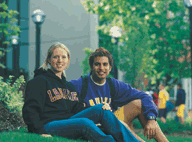Examinations
Website: https://students.wlu.ca/academics/exams/index.html
- Final University Examinations
- Examination Regulations for Candidates
- Assignments and Tests in the Last Week of Classes
- Challenge-For-Credit
- Deferred Examination Policy
- Students with Disabilities: Examinations and Tests
- Religious Grounds and Examination Scheduling
- Special Examinations
- Validating Examinations
- Aegrotat Standing
The university shall conduct a final examination period in each academic session for undergraduate students. Individual instructors through their academic units will determine evaluation methods for particular courses and if a final examination will be required. End of course evaluation methods may take a variety of forms, including oral presentations, take-home examinations, major assignments and proctored examinations. Individual instructors through their academic units will determine what percent of course evaluation will be based on proctored examinations and other forms of evaluation.
Examinations are randomly scheduled and students registered in evening sections may be required to write final examinations during the day. The maximum time allowed for the writing of a formally scheduled final examination will be two and a half hours (150 minutes). Students are strongly urged not to make any commitments (i.e., vacation) during the examination period. Students are required to be available for examinations during the examination periods of all terms in which they register. Students who register in courses from more than one academic institution are responsible for any examination conflicts generated by their actions. The university attempts, as much as possible, to keep one day a week free during the final examination period.
Students are normally not required to complete more than two final examinations in a 24 hour period. In order to receive relief under this rule, the third "offending" examination must start and finish within 24 hours of the beginning of the first examination. For example, students will not receive relief under this regulation when their examinations begin at, 9:00 am and 2:00 pm on one day, and 9:00 am on the following day. To receive relief under this regulation students must notify their dean's office at least three business days before the beginning of the first of the three problematic examinations. The university reserves the right to select which examination is to be deferred.
Final examinations take place at the end of every term. Candidates are expected to fulfill this obligation in an honest manner.
As an academic institution, the university's credibility depends upon the integrity of the examination process. With this in mind, the following are a set of rules to guide candidates:
Attendance and Identification
- Candidates writing examinations are responsible for arriving at the right time and place. They must have their Laurier student identification cards in their possession. Forgetfulness or inadvertently arriving at the wrong time or place cannot be considered acceptable excuses.
Examination Process
- The doors of the examination room will be opened approximately 10 minutes before the start of the examination. Candidates will be permitted to enter the examination room quietly up to one half hour after the scheduled start of the exam. Candidates arriving late will not be allowed any extra time.
- Candidates must not begin the examination or attempt to read the examination questions until instructed to do so.
- Candidates once having entered, may not leave the exam room before completing and submitting the exam unless accompanied by a Proctor. Candidates are not permitted to submit their examination and leave the examination room until 1 hour after the examination has begun, and in no case before their attendance has been taken in accordance with FIPPA 2006 rules and regulations. (Freedom of Information & Protection of Privacy). In no case may a candidate leave the room temporarily, for any reason, until 30 minutes after the start of the examination. In order that remaining candidates are not disrupted, candidates must remain seated and may not leave the examination room during the last 15 minutes of the examination session.
- At the close of the examination period, candidates must stop writing immediately. The Presiding Officer may seize the papers of candidates who fail to observe this requirement, and a penalty may be imposed at the discretion of the instructor. Candidates must submit all their work, according to the instructions of the Presiding Officer, including all materials and a copy of the examination paper with their name and student ID number written on it. Unused examination booklets may not be taken from the examination room.
- A candidate who leaves before the examination is over must hand in all completed and attempted work, notes made during the exam, and a copy of the examination paper with their name and student ID number on it.
- Talk or any form of communication between candidates is absolutely forbidden. No information of any kind is to be written on the question paper or on scrap paper for the purpose of assisting other candidates. Responses to questions must not be done in an exaggerated way or in a manner that will involve transmission of information to others.
- Candidates must remain seated during the examination period. A candidate needing to speak to the proctor (e.g., to ask for additional supplies or to request permission to leave the examination room for any reason) should so indicate by raising their hand.
- Questions concerning possible errors, ambiguities or omissions in the examination paper must be directed to the proctor who will investigate them through the proper channels. The proctor is not permitted to answer questions other than those concerning the examination paper.
- Candidates must not use or attempt to use any improper source of information. No candidates for an examination may bring into the examination room any books, notes or other material containing information pertaining to the examination unless the examiner has given instructions that such material will be allowed and this instruction is specified on the examination paper. Any item brought into the examination room is subject to inspection.
- No briefcases, backpacks or other bags and carriers may be brought to the desk site where the candidate is writing a midterm or final examination. If these items are brought to the examination room, they must be put at the front in a place designated by the proctor before a candidate takes a seat. Students are fully responsible for their own personal belongings and it is strongly recommended that candidates not bring any items of value to the examination room (such as laptops, phones, IPods, etc.). Laurier is not responsible for any loss or damage to student property.
- No electronic or communication devices will be allowed in the examination room, including cell phones, smartphones, pagers, etc. Calculators are not allowed unless specified by the instructor and indicated on the examination paper. Only non-programmable models authorized by the instructor will be allowed. It is the candidate's responsibility to ascertain whether the use of calculators is permitted, and, if it is, whether any restrictions are imposed on the types of calculators that may be brought to the examination.
- Translation dictionaries (e.g., English-French) or other dictionaries, (thesaurus, definitions, technical) are not allowed unless specified by the instructor and indicated on the examination paper. Electronic dictionaries are never allowed.
- Except for bottled water, no food or drink is allowed in the examination room. Candidates with health problems that warrant relaxation of this regulation should provide medical documentation to the presiding officer prior to the beginning of the examination. Such students should restrict themselves to those items and packaging that will least distract other examinees.
- Candidates are expected to write their examinations in an honest and straightforward manner. Where there are reasonable grounds for believing a violation of exam protocol has occurred, the candidate will be subject to the disciplinary procedures and sanctions according to the Undergraduate Academic Calendar.
- Only currently registered students will be permitted to write the final exam.
- Examinations conducted at Wilfrid Laurier University will be bound by WLU regulations, regardless of where the candidate is registered.
- As per the Senate Guidelines used when Planning the Academic Year, should the university close on any of the last five days of regularly scheduled classes, cancelled classes may be rescheduled in the two study days occurring before the examination period. In such a case, the examination period would not be altered. Any day the university is closed during the last five days of regularly scheduled classes will be considered a study day.
Materials and Aids
Expected Conduct and Sanctions
University Closure and the Examination Period
Normally, work such as assignments or tests, due in the last week of classes will be made known to a class at the beginning of the term. In no case, after the first half of the term, shall the assignment of such work first be made known to a class. To ensure that the workload of students is not unreasonable in the last week of classes, the university sets the following limits for the final week of regularly scheduled classes of each term:
- Assignments, projects, presentations and other evaluated work, to a maximum worth of 50 percent of the total marks available in the course, may be due for submission or presentation during the last week;
- In a course or section with a final examination scheduled in the examination period, an in-class test or examination worth no more than 20 percent of the total marks available in the course may be administered during the last week of classes;
- In a course or section that does not have a final examination scheduled in the examination period, no tests or examinations may be administered during the last week of classes, excepting only small quizzes and the like, worth no more than 10 percent, that are part of a weekly or biweekly series of such items.
The Challenge-for-Credit procedure is for a student who has obtained knowledge of the subject matter of a course in a manner that does not permit advanced standing credit either by transfer or validating examination. Credit can be granted only for those courses specifically designated as "Challenge-for-Credit" in the course description. Regulations that apply to Challenge-for-Credit are available from the applicable department or the Office of Enrolment Services. The course tuition fee applies.
A notation will appear on the student's transcript (refer to previous Grading System section).
Final examinations for any course cannot be deferred more than twice. Students may receive a maximum of five exam deferrals during the completion of their degree.
If for reasons of illness or an unavoidable conflict a student cannot write a final exam as scheduled, the following options are available:
- The student may apply to the instructor or designate to be allowed to write the exam at an alternative time, ideally during the regularly scheduled examination period, but at the latest not beyond the date by which final grades for the last scheduled exam are to be submitted to the Office of Enrolment Services (i.e., 96 hours after the scheduled examination period ends). There is no charge for this application. The procedures for application, approval, and implementation of these 'in-house alternative' examinations shall be established at the departmental level.
- The student may apply to the instructor for aegrotat standing (refer to policy section on Aegrotat Standing which follows). There is no charge for this application.
- If neither of these options is granted, the student may appeal to the petitions committee in the academic unit in which the course is offered (not the one in which the student is registered); the petitions committee may grant aegrotat status or, time permitting, an in-house alternative exam as per the second note above; if the petition is granted too late to permit such an in-house alternative, the student must write the exam during the next* regularly scheduled final exam period. In the latter case, the standard, non-refundable deferred examination fee will apply. Refer to the Petitions section later in this chapter.
- Fall term examination – written in fall term deferred examination period (last week of January)*
- Winter term examination – written in winter term deferred examination period (last week of May)*
- Intersession examination – written in Spring term deferred examination period (last week of August)*
- Spring term examination – written in Summer session deferred examination period (last week of August)*
- Summer session examination – written in summer session term deferred examination period (last week of September)*
- If the student does not write the examination, an examination grade of "0" will be assigned. The student may petition the final grade to the petitions committee in the academic unit in which the course is offered (not the one in which the student is registered); the petitions committee may grant aegrotat status or the opportunity to write the exam during the next regularly scheduled final exam period (refer to the schedule given above). In the latter case, the standard, non-refundable deferred examination fee will apply.
- If a petition to the faculty petitions committee is denied, the student may petition the Senate Student Appeals Committee. If the petition is granted, the student must write the exam during the next regularly scheduled final exam period (refer to the schedule given above). The standard, non-refundable deferred examination fee will apply.
Students with disabilities requiring special arrangements to write examinations should contact the Accessible Learning Centre, ext. 3086, at the beginning of the term. Reference the Accessible Learning Centre and the Policy for Academic Accommodation of Undergraduate Students with Disabilities.
The university acknowledges that, due to the pluralistic nature of the university community, some students may on religious grounds require alternative times to write examinations and tests. Accordingly, a student who requires an alternative examination or test time on religious grounds should provide a written self-declaration to the secretary of the faculty petitions committee which will be kept on file. Deferred examination requests must be submitted to the faculty petitions committee with appropriate documentation. Such a request should be made within one week of the announcement of the test or examination date.
A special examination is any examination, granted by the petitions committee, other than a final or deferred examination. Application for consideration must be made to the registrar within 30 days of the date of the release of final examination results. For the appropriate procedures, refer to the Academic Petitions section of this chapter. The fee is not refundable. Students should note that if they write more than one examination in any course, the last mark obtained shall be the only one considered valid.
A validating examination is a special examination, which is required of a student requesting advanced standing in a course not beyond the 100 level. The course may have been completed at a post-secondary institution of less than university status, which in Canada or the United States is neither a member nor an affiliate of a member of the Association of Universities and Colleges of Canada or the American Association of Universities and Colleges. Such examinations must be completed within one year of the date of admission to Wilfrid Laurier University. A final examination may be used as a validating examination.
Students will not receive credit until they have completed a course at this university.
To write a validating examination, the student must make application to the Office of Enrolment Services as well as receive permission from the department concerned. A fee is charged and is not refundable. Students admitted to the Faculty of Music will be governed by the statement on Validating Examinations in the Faculty of Music chapter.
In exceptional circumstances, students may be eligible to be exempted from writing the final examination in a course. Students should apply to their instructor as soon as the relevant circumstances are known. This should be done before the examination time, after consulting the specific aegrotat policies and procedures in the particular faculty or department involved. Students are eligible to be considered for aegrotat standing only if (a) a special situation warrants it and (b) if a sufficient amount of required term work has been completed satisfactorily as determined by the faculty or department. Notification of the aegrotat grade(s) must be given to the Office of Enrolment Services - Records Department.
The Faculty of Music has developed its own aegrotat standing policy which is given in the Faculty of Music chapter.






